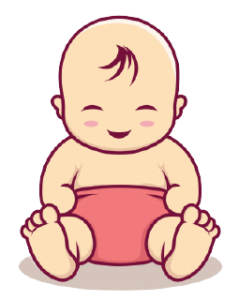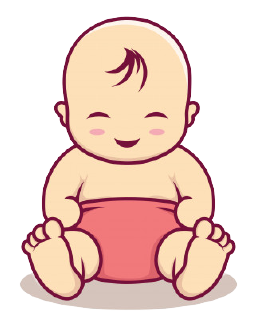Baby poop is a new science that all the new parents have to learn after the birth of a baby. Each time you have a baby, you will learn more on this subject of poop science. You will have many more questions about the poop of your baby than you will ever imagine. How many times should my baby poop? What color should baby poop look like? How should baby poop smell like? What is the ideal consistency of baby poop? As a pediatrician, I deal with a ton of poop-related questions every day.
Monitoring the dirty diapers of your baby is essential to know whether your baby is growing healthy. If your baby is getting enough milk, he will have several dirty diapers a week according to his age. Baby poop is also an indicator of health conditions such as dehydration and constipation. Depending on whether your baby is breastfed or formula-fed, the answers to the above questions will change.
In this article, I will cover the topics of how many times your baby should poop, poop consistency and when to be concerned about poop problems. The frequency, consistency, and color of poop will change with age and many other factors so there is a lot to know. Here is a brief chapter on baby poop science!
CONTENT
1. How many times should my baby poop?
3. Reasons for changes in baby poop.
4. When to consult a doctor about baby poop?
1. How many times should my baby poop?
The amount of dirty diapers that a baby should have daily depends on his age. If your baby is breastfed, he will have several dirty diapers a day while a formula-fed baby will have fewer dirty diapers.
All the newborns will pass meconium in the first few days after the birth. Meconium will make baby poop a black, thick, and sticky tar-like substance. From the third day, baby poop will become runny in shades of yellow, brown, or green.
This is a brief guide on how many times your baby should poop depending on their age.
- Breastfed babies
For the first two days of their life, breastfed newborns will pass meconium. By the third or fourth day, baby poop will become yellow or green.
During the first six weeks, a breastfed baby will have runny yellow poop. He will have around three bowel moments a day but some babies will have four to twelve dirty diapers which is also normal.
After six weeks, the pooping pattern of your baby will change and he will go a day or two without pooping. When your baby is introduced to solid food, he will poop a few times more than he used to before.
- Formula-fed babies
Same as the breastfed babies, formula-fed babies will pass meconium in the first two days and have yellow or green colored runny poop by the fourth day.
You will observe brownish or greenish poop in your formula-fed baby’s diaper from the fourth day. Then he will be passing stool one to four times a day. But after the first month, your baby will poop only every other day. The baby will pass stool one to two times a day after starting to have solid food.
There is no need to monitor the dirty diapers of your baby after the first six weeks as long as your baby is passing stool without pain and gain weight.

2. Consistency of baby poop
The texture of the baby poop will change significantly depending on what your baby eats. If your baby is breastfed, you can expect seedy, loose stool that looks like mustard or runny stool. It is a sign that the baby is efficiently absorbing the solid in breastmilk.
The color of the poop passed by formula-fed fed babies will vary from yellowish-green to brown. Their poop will be harder and paste-like than the poop of a breastfed baby but it should not be thicker than peanut butter.
3. Reasons for changes in baby poop.
As your baby grows in age, the color and texture of their poop will change as well as the frequency of passing them. A change in the diet of your baby such as switching from breastmilk to formula can change the consistency, color, and frequency of poop considerably. Transition to solid food will also affect the nature and frequency of your baby’s poop. If there is a concerning change in the stool of your baby, consult your pediatrician immediately.
4. When to consult a doctor about baby poop?
If you notice the following in your baby’s dirty diapers, seek medical help immediately.
- Maroon or bloody poop.
- Black poop after the fourth day from birth.
- White or grey poop
- Pooping many times a day than the usual of your baby
- Poop with a large amount of mucus or water
If your baby poop frequently than usual and the poop is watery and greener, it can be a sign your baby has diarrhea. Diarrhea can lead to dehydration, and frequent pooping is uncomfortable for your baby. So consult your pediatrician immediately if you think your baby is experiencing diarrhea.
Breastfed babies might experience constipation even if it is not common in the newborn stage. If you suspect that your baby is constipated, it is better to consult your pediatrician. Fruit juices can help with constipation but you should never give any juice or o a newborn without medical advice.
When a breastfed baby is not pooping as much as he is expected to, it can be a consequence of insufficient milk supply. In that case, you will have to meet the pediatrician or the lactation consultant to check for his latching and the mother’s milk supply.
Bright green or neon green poop can also be a sign of a virus in a breastfed baby although it is normal in most instances. But if this color prevails for days, consult your pediatrician to make sure that it is not a symptom of a virus.


